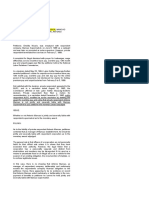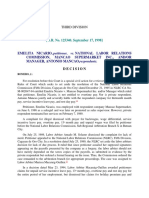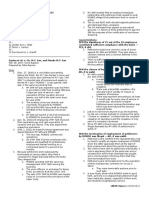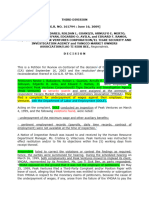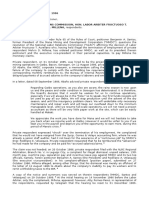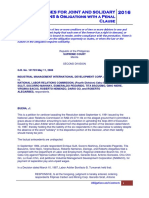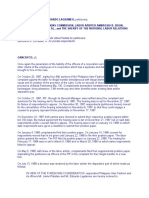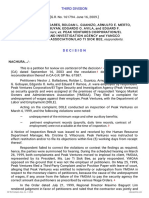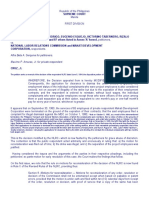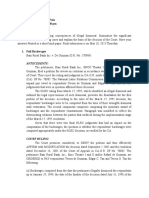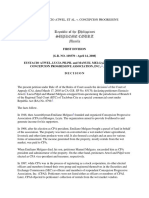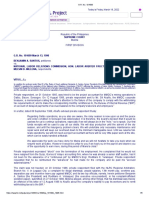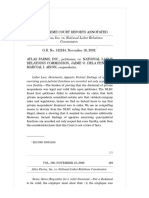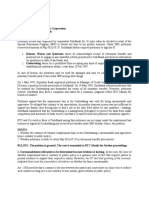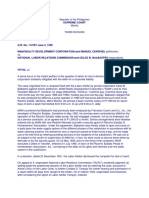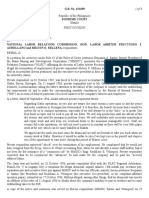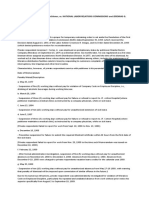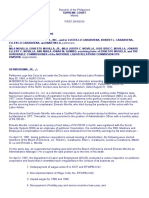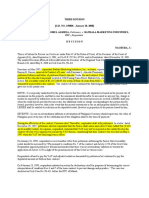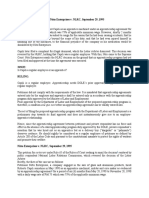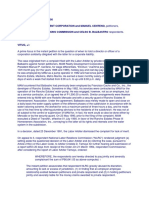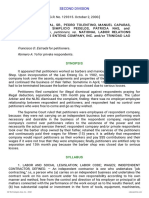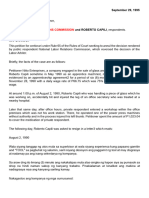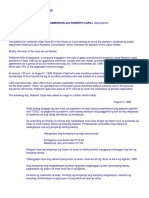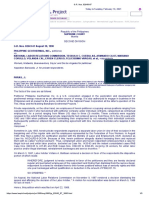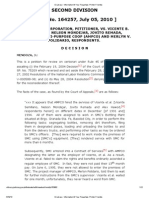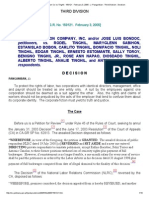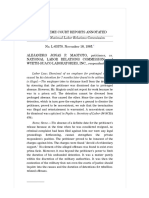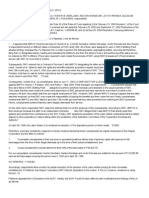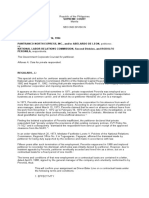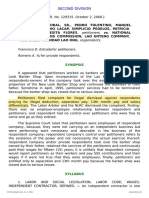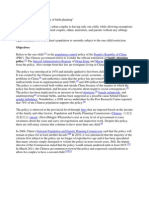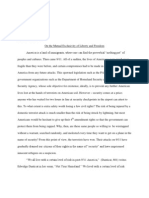180 Digest Nicario Vs NLRC
180 Digest Nicario Vs NLRC
Uploaded by
Kristian Weller Peñanueva LicupCopyright:
Available Formats
180 Digest Nicario Vs NLRC
180 Digest Nicario Vs NLRC
Uploaded by
Kristian Weller Peñanueva LicupOriginal Description:
Original Title
Copyright
Available Formats
Share this document
Did you find this document useful?
Is this content inappropriate?
Copyright:
Available Formats
180 Digest Nicario Vs NLRC
180 Digest Nicario Vs NLRC
Uploaded by
Kristian Weller Peñanueva LicupCopyright:
Available Formats
G.R. No. 125340.
September 17, 1998]
EMELITA NICARIO, petitioner, vs. NATIONAL LABOR RELATIONS
COMMISSION, MANCAO SUPERMARKET INC., AND/OR MANAGER,
ANTONIO MANCAO, respondents.
FACTS: Petitioner, Emelita Nicario, was employed with respondent
company Mancao Supermarket, on June 6, 1986 as a salesgirl and was later on
promoted as sales supervisor. However, private respondent terminated her
services on February 7, 1989.
On July 25, 1989, Labor Arbiter Amado M. Solamo dismissed the complaint
for lack of merit. Petitioner appealed to the National Labor Relations
Commission (NLRC), Fifth Division, Cagayan de Oro City. In a resolution dated
July 25, 1989, the NLRC set aside the labor arbiters decision for lack of due
process. It ruled that since petitioner assailed her supposed signatures
appearing on the payrolls presented by the company as a forgery, the labor
arbiter should not have merely depended on the xerox copies of the payrolls, as
submitted in evidence by the private respondent but ordered a formal hearing on
the issue. Thus, the Commission ordered the case remanded to the arbitration
branch for appropriate proceedings. The case was assigned to Labor Arbiter
Marissa Macaraig-Guillen.[2]
In her claim for payment of overtime pay, petitioner alleged that during her
period of employment, she worked twelve (12) hours a day from 7:30 a.m. to
7:30 p.m., thus rendering overtime work for four hours each day. Labor Arbiter
Macaraig-Guillen, in her decision dated May 23, 1994, awarded overtime pay to
petitioner by taking judicial notice of the fact that all Mancao establishments
open at 8:00 a.m. and close at 8:00 p.m.. Upon appeal, this particular finding
was affirmed by the Commission. However, when private respondent filed a
motion for reconsideration from the resolution dated August 16, 1995, the NLRC
modified its earlier ruling and deleted the award for overtime pay. Public
respondent NLRC instead gave credence to the daily time records (DTRs)
presented by respondent corporation showing that petitioner throughout her
employment from June 6, 1986 to February 1989, worked only for eight hours a
day from 9:00 a.m. to 12:00 p.m. and 2:00 p.m. to 7:00 p.m., and did not render
work on her rest days.
ISSUE: 1. WON Petitioner rendered overt-time work and is entitled of overtime
pay? -YES
2. WON Antonio Mancao as the manager acted maliciously or deliberately in the
non-payment of benefits to petitioner and can be held jointly and severally liable
with Mancao supermarket ? - NO
RULING. 1:
The uniformity and regularity of the entries are badges of untruthfulness and
as such indices of dubiety.[11] The observations made by the Solicitor General
regarding the unreliability of the daily time records would therefore seem more
convincing. On the other hand, respondent company failed to present
substantial evidence, other than the disputed DTRs, to prove that petitioner
indeed worked for only eight hours a day.
It is a well-settled doctrine, that if doubts exist between the evidence
presented by the employer and the employee, the scales of justice must
be tilted in favor of the latter. It is a time-honored rule that in controversies
between a laborer and his master, doubts reasonably arising from the
evidence, or in the interpretation of agreements and writing should be
resolved in the formers favor.[12] The policy is to extend the doctrine to a
greater number of employees who can avail of the benefits under the law, which
is in consonance with the avowed policy of the State to give maximum aid and
protection of labor.[13]This rule should be applied in the case at bar, especially
since the evidence presented by the private respondent company is not
convincing. Accordingly, we uphold the finding that petitioner rendered
overtime work, entitling her to overtime pay.
RULING NO. 2: NO
The general rule is that officers of a corporation are not personally
liable for their official acts unless it is shown that they have exceeded their
authority. However, the legal fiction that a corporation has a personality
separate and distinct from stockholders and members may be disregarded
if it is used as a means to perpetuate fraud or an illegal act or as a vehicle
for the evasion of an existing obligation, the circumvention of statutes, or
to confuse legitimate issues.[14]
In this case, there is no showing that Antonio Mancao, as manager of
respondent company, deliberately and maliciously evaded the
respondent's company financial obligation to the petitioner. Hence, there
appearing to be no evidence on record that Antonio Mancao acted maliciously or
deliberately in the non-payment of benefits to petitioner, he cannot be held
jointly and severally liable with Mancao supermarket.
You might also like
- Dishonour of Cheques in India: A Guide along with Model Drafts of Notices and ComplaintFrom EverandDishonour of Cheques in India: A Guide along with Model Drafts of Notices and ComplaintRating: 4 out of 5 stars4/5 (1)
- The Criminal Procedure in The PhilippinesDocument4 pagesThe Criminal Procedure in The PhilippinesRacinef Tee100% (3)
- Co Signer StatementDocument1 pageCo Signer StatementMarriane Sapitan Florentino100% (1)
- Nicario vs. NLRCDocument1 pageNicario vs. NLRCElreen Pearl AgustinNo ratings yet
- Nicario Vs NLRCDocument4 pagesNicario Vs NLRCJane Dela CruzNo ratings yet
- Labor Cases Annie, Harry, PiaDocument66 pagesLabor Cases Annie, Harry, PiaCarl Harry SalvacionNo ratings yet
- Labor 1 - Digests - 110515Document15 pagesLabor 1 - Digests - 110515Karla BeeNo ratings yet
- Timbol and Associates For Private RespondentDocument40 pagesTimbol and Associates For Private RespondentIvan_jaydeeNo ratings yet
- 013-Ocampo Jr. v. NLRC, G.R. No. 81077, 6 June 1990Document4 pages013-Ocampo Jr. v. NLRC, G.R. No. 81077, 6 June 1990Jopan SJ100% (1)
- Balladares vs. Peak Ventures (July 16, 2009)Document7 pagesBalladares vs. Peak Ventures (July 16, 2009)Wingel Hope Mahinay RampingNo ratings yet
- Mam Realty Development Corp. Vs NLRCDocument3 pagesMam Realty Development Corp. Vs NLRCbenNo ratings yet
- Digest LaborDocument26 pagesDigest LaborFay FernandoNo ratings yet
- Lambo vs. NLRCDocument5 pagesLambo vs. NLRCMj BrionesNo ratings yet
- Lambo V NLRCDocument12 pagesLambo V NLRCGertrude ArquilloNo ratings yet
- Corpo CasesDocument35 pagesCorpo CasesNovelyn J HicarNo ratings yet
- Rural Bank of Alaminos Employees Union (Rbaeu) and Ismael Tamayo, Sr. vs. NLRCDocument9 pagesRural Bank of Alaminos Employees Union (Rbaeu) and Ismael Tamayo, Sr. vs. NLRCLouise AngeliqueNo ratings yet
- Avelino Lambo and Vicente Belocura, Petitioners, vs. National Labor Relations COMMISSION and J.C. TAILOR SHOP And/or JOHNNY CO, Respondents. Decision Mendoza, J.Document8 pagesAvelino Lambo and Vicente Belocura, Petitioners, vs. National Labor Relations COMMISSION and J.C. TAILOR SHOP And/or JOHNNY CO, Respondents. Decision Mendoza, J.nathNo ratings yet
- Almeda Vs CaDocument5 pagesAlmeda Vs CaCamille GrandeNo ratings yet
- Joint and Solidary Obligations and Obli With Penal Clause PDFDocument70 pagesJoint and Solidary Obligations and Obli With Penal Clause PDFMecs Nid100% (1)
- Pabalan Vs NLRCDocument4 pagesPabalan Vs NLRCKat LucenaNo ratings yet
- 163625-2009-Balladares v. Peak Ventures Corp.Document7 pages163625-2009-Balladares v. Peak Ventures Corp.Mau AntallanNo ratings yet
- Fuck ScribdDocument427 pagesFuck ScribdDaryl Jacob BigayNo ratings yet
- G.R. No. 87700Document4 pagesG.R. No. 87700Angiela HilarioNo ratings yet
- Pabalan Vs NLRCDocument2 pagesPabalan Vs NLRCeunice demaclidNo ratings yet
- Memorandum Appeal - XYSADocument17 pagesMemorandum Appeal - XYSADanpatz Garcia100% (1)
- 29 Santos V NLRC, GR No. 101699, March 13, 1996, 254 SCRA 673Document7 pages29 Santos V NLRC, GR No. 101699, March 13, 1996, 254 SCRA 673Edgar Calzita AlotaNo ratings yet
- Cases For Digest 1Document21 pagesCases For Digest 1ejcpm22No ratings yet
- Final EthicsDocument5 pagesFinal EthicsMaureen Kaye PaloNo ratings yet
- 2) Atwel Vs Concepcion Progressive CorpDocument8 pages2) Atwel Vs Concepcion Progressive Corpaljohn pantaleonNo ratings yet
- 20 - G.R. No. 101699Document5 pages20 - G.R. No. 101699Clarince Joyce Lao DoroyNo ratings yet
- Atlas Farms, Inc. vs. National Labor Relations Commission PDFDocument15 pagesAtlas Farms, Inc. vs. National Labor Relations Commission PDFCamille Yasmeen SamsonNo ratings yet
- Rolando Rivera Vs Solidbank CorporationDocument3 pagesRolando Rivera Vs Solidbank CorporationPia0% (1)
- 10 MAM Realty Dev Corp Vs NLRC, GR No. 114787Document3 pages10 MAM Realty Dev Corp Vs NLRC, GR No. 114787Marlito Joshua AmistosoNo ratings yet
- 37-Santos v. NLRC G.R. No. 101699 March 13, 1996 PDFDocument4 pages37-Santos v. NLRC G.R. No. 101699 March 13, 1996 PDFJopan SJNo ratings yet
- ManilaDocument5 pagesManilaJonathan Aquino CarpizoNo ratings yet
- Mainland Vs MovillaDocument4 pagesMainland Vs MovillaChristian ALNo ratings yet
- 2 - Almeda Vs Bathala MarketingDocument6 pages2 - Almeda Vs Bathala Marketingdaniel angelNo ratings yet
- Module 5 and Sime DerbyDocument20 pagesModule 5 and Sime DerbySteph ParadiseNo ratings yet
- 17 Santos Vs NLRCDocument4 pages17 Santos Vs NLRCImariNo ratings yet
- Ls DigestsDocument213 pagesLs DigestschibilexNo ratings yet
- Labor Stds DigestsDocument213 pagesLabor Stds DigestsXianyue04100% (1)
- Hacienda Fatima vs. National Federation of Sugarcane Workers-Food and General LtradeDocument4 pagesHacienda Fatima vs. National Federation of Sugarcane Workers-Food and General LtradeBasil Isk100% (1)
- 3cases 08-07Document10 pages3cases 08-07benbongon31No ratings yet
- 15 118427-2000-Corporal - Sr. - v. - National - Labor - Relations PDFDocument8 pages15 118427-2000-Corporal - Sr. - v. - National - Labor - Relations PDFGabrielle Anne EndonaNo ratings yet
- Labor Law CasesDocument33 pagesLabor Law CasesEd TorralbaNo ratings yet
- G.R. No. 188002 February 1, 2010 Goodrich Manufacturing Corporation vs. Emerlina AtivoDocument10 pagesG.R. No. 188002 February 1, 2010 Goodrich Manufacturing Corporation vs. Emerlina AtivoElla RotsapNo ratings yet
- Labor (Nittyo and Bernardo)Document20 pagesLabor (Nittyo and Bernardo)pau.au mendozaNo ratings yet
- Philippine Geothermal Inc vs. NLRCDocument3 pagesPhilippine Geothermal Inc vs. NLRCLucy HeartfiliaNo ratings yet
- (GR) San Miguel Corp. V Semillano (2010)Document12 pages(GR) San Miguel Corp. V Semillano (2010)Jackie CanlasNo ratings yet
- Pamplona Plantation Co Vs Tinghil - 159121 - February 3, 2005 - JDocument10 pagesPamplona Plantation Co Vs Tinghil - 159121 - February 3, 2005 - JQueenie SabladaNo ratings yet
- Magtoto vs. National Labor Relations CommissionDocument17 pagesMagtoto vs. National Labor Relations CommissionPia SottoNo ratings yet
- Good Earth Emporium Inc and Lim Ka Ping, Petitionersv - CA and Roces-Reyes Realty Inc., RespondentsDocument26 pagesGood Earth Emporium Inc and Lim Ka Ping, Petitionersv - CA and Roces-Reyes Realty Inc., RespondentsMarGon MartelNo ratings yet
- 7 San Miguel Vs SemillanoDocument4 pages7 San Miguel Vs SemillanoEdward Caesar Jacalan BedroNo ratings yet
- Agabon Vs NLRCDocument21 pagesAgabon Vs NLRCinvictusincNo ratings yet
- Supreme Court: The Government Corporate Counsel For Petitioner. Alfonso A. Osia For Private RespondentDocument5 pagesSupreme Court: The Government Corporate Counsel For Petitioner. Alfonso A. Osia For Private RespondentElleNo ratings yet
- 3 - Corporal Sr. v. NLRCDocument9 pages3 - Corporal Sr. v. NLRCchelsNo ratings yet
- Avoiding Workplace Discrimination: A Guide for Employers and EmployeesFrom EverandAvoiding Workplace Discrimination: A Guide for Employers and EmployeesNo ratings yet
- Consumer Protection in India: A brief Guide on the Subject along with the Specimen form of a ComplaintFrom EverandConsumer Protection in India: A brief Guide on the Subject along with the Specimen form of a ComplaintNo ratings yet
- Bar Review Companion: Taxation: Anvil Law Books Series, #4From EverandBar Review Companion: Taxation: Anvil Law Books Series, #4No ratings yet
- Corpo Chapter 4 Part 2Document54 pagesCorpo Chapter 4 Part 2Kristian Weller Peñanueva LicupNo ratings yet
- AC Ransom Labor Union V NLRCDocument1 pageAC Ransom Labor Union V NLRCKristian Weller Peñanueva LicupNo ratings yet
- 36 - Digest - Asuncion Vs de YriarteDocument3 pages36 - Digest - Asuncion Vs de YriarteKristian Weller Peñanueva LicupNo ratings yet
- 35 - Digest - Sy Vs Tyson EnterpricesDocument1 page35 - Digest - Sy Vs Tyson EnterpricesKristian Weller Peñanueva LicupNo ratings yet
- Uy Siuliong Vs Director of CommerceDocument2 pagesUy Siuliong Vs Director of CommerceKristian Weller Peñanueva LicupNo ratings yet
- Articles of IncorporationDocument6 pagesArticles of IncorporationKristian Weller Peñanueva LicupNo ratings yet
- Goldloop Vs GsisDocument3 pagesGoldloop Vs GsisKristian Weller Peñanueva LicupNo ratings yet
- Batch 1 Digest WelzDocument17 pagesBatch 1 Digest WelzKristian Weller Peñanueva LicupNo ratings yet
- Bank of America Vs American Realty Corporation GR 133876 December 29, 1999 FactsDocument19 pagesBank of America Vs American Realty Corporation GR 133876 December 29, 1999 FactsKristian Weller Peñanueva LicupNo ratings yet
- Supreme Court: City Fiscal Manuel T. Reyes For Petitioner. Sevilla, Daza and Associates For RespondentsDocument35 pagesSupreme Court: City Fiscal Manuel T. Reyes For Petitioner. Sevilla, Daza and Associates For RespondentsKristian Weller Peñanueva LicupNo ratings yet
- Harvard Electronics, A Division of FEL Corporation v. International Business Machines Corporation, Harvard Electronics, A Division of FEL CorporationDocument1 pageHarvard Electronics, A Division of FEL Corporation v. International Business Machines Corporation, Harvard Electronics, A Division of FEL CorporationScribd Government DocsNo ratings yet
- Lanbdank ApplicationDocument2 pagesLanbdank Applicationromer kevin alejandrinoNo ratings yet
- United States v. Sheridan, 4th Cir. (2005)Document3 pagesUnited States v. Sheridan, 4th Cir. (2005)Scribd Government DocsNo ratings yet
- Dar Ao3 S. 2023Document21 pagesDar Ao3 S. 2023Joanne Marie PradasNo ratings yet
- Reynoso IV Vs Court of Appeals 345 Scra 335Document10 pagesReynoso IV Vs Court of Appeals 345 Scra 335Mp CasNo ratings yet
- PROVINCIAL List R4ADocument4 pagesPROVINCIAL List R4ALeah TalonNo ratings yet
- Six Point Movement and Agartala Conspiracy CaseDocument6 pagesSix Point Movement and Agartala Conspiracy CaseFivefiso SteveNo ratings yet
- Rights of IccsDocument2 pagesRights of IccsIvy PazNo ratings yet
- Hyatt Elevators V Goldstar Elevators Full TextDocument4 pagesHyatt Elevators V Goldstar Elevators Full TextanailabucaNo ratings yet
- Defection Politics in India:A Threat To The Stability of DemocracyDocument8 pagesDefection Politics in India:A Threat To The Stability of DemocracySharon SNo ratings yet
- One Child PolicyDocument1 pageOne Child PolicyPararat LaipanyaNo ratings yet
- Appeals ChartDocument1 pageAppeals ChartNeapolle FleurNo ratings yet
- SynthessayDocument4 pagesSynthessayMatt Boran100% (1)
- Case Digest Legal Ethic Canon 12Document2 pagesCase Digest Legal Ethic Canon 12MsTheIntrovertNo ratings yet
- 05 Nov 2023 Test QPDocument12 pages05 Nov 2023 Test QPBhargav RajNo ratings yet
- Payment of Bonus Act, 1965: "Anyone Who Has Never Made A Mistake Has Never Tried Anything New."Document17 pagesPayment of Bonus Act, 1965: "Anyone Who Has Never Made A Mistake Has Never Tried Anything New."shubham kumarNo ratings yet
- Local Government Code of 1991 (Updated)Document218 pagesLocal Government Code of 1991 (Updated)Arahbells100% (2)
- Case Digest - CIR vs. CA 261 SCRA 262, G.R. No. 119761, August 29, 1996Document2 pagesCase Digest - CIR vs. CA 261 SCRA 262, G.R. No. 119761, August 29, 1996Lu Cas100% (3)
- 1take Action On Behalf of The Children of SA - (MINISTERS EMAILS (Calibri Font)Document2 pages1take Action On Behalf of The Children of SA - (MINISTERS EMAILS (Calibri Font)bennyblanco12351No ratings yet
- Federalism PaperDocument30 pagesFederalism PaperBianca Taylan PastorNo ratings yet
- Moran, The Rise of The Regulatory State in BritainDocument0 pagesMoran, The Rise of The Regulatory State in BritainRachana SudhirNo ratings yet
- Colorado Driver's HandbookDocument42 pagesColorado Driver's HandbookamarsubNo ratings yet
- SRC HSSE PRO 06 HSSE Operational ControlDocument4 pagesSRC HSSE PRO 06 HSSE Operational Controlalyssa tajonNo ratings yet
- Case ChartDocument14 pagesCase ChartKirstenP14No ratings yet
- Corporate GovernanceDocument18 pagesCorporate GovernancePankaj DadhichNo ratings yet
- St. Basil's Cathedral, MoscowDocument16 pagesSt. Basil's Cathedral, MoscowPola TharwatNo ratings yet
- Complaint in Farrar V Arkansas Department of Human Service.Document17 pagesComplaint in Farrar V Arkansas Department of Human Service.Russ RacopNo ratings yet
- Doctrine of Piercing The Corporate Veil - Case DigestDocument2 pagesDoctrine of Piercing The Corporate Veil - Case DigestlookalikenilongNo ratings yet



